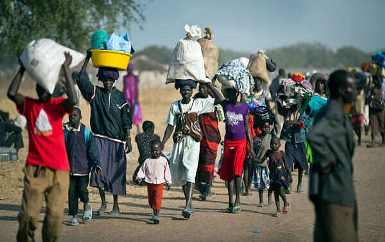Refugee influx sparks humanitarian concerns in E. Equatoria
By Ijoo Bosco
January 18, 2014 (TORIT) – Eastern Equatoria governor Louis Lobong Lojore said there are growing concerns within his government about the humanitarian situation in the state following a massive influx of refugees seeking refuge from fighting in other parts of South Sudan.

In the press statement, the governor emphasised that the government and its partners are working hard to address humanitarian challenges on the ground as a matter of urgency.
Lobong said plans are underway to establish two camps for newly arrived IDPs as part of efforts to ensure prompt delivery of services, particularly to the most vulnerable groups.
One camp will be set up at Kapoeta South county, with another planned at Magwi county.
Lobong added that assistance may also be provided to people in other locations proved to be in genuine need.
He appealed to the national government, particularly the crisis management committee, to expedite humanitarian support to all those in need of assistance.
Lobong has further appealed for NGOs, faith-based organisations and the local business community to help Eastern Equatoria cope with the influx.
The governor also underscored that the security situation in Eastern Equatoria remained stable, urging local citizens and newly arrived displaced people to live together in peace and in harmony.
Violence broke out in the South Sudan capital, Juba, on 15 December and since spread to other parts of the country, slitting along ethnic fault lines.
The UN estimates that at least 1,000 people have been killed and more than 400,000 displaced.
Thousands of displaced people have taken shelter at UN compounds inside South Sudan, with other fleeing to neighbouring African countries.
Aid agencies have expressed concern that ongoing fighting is preventing them from accessing many areas, while looting of humanitarian sites around the country is also hampering relief efforts.
(ST)
